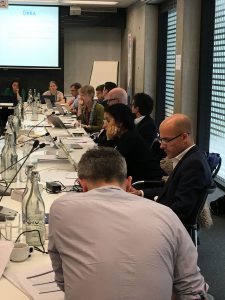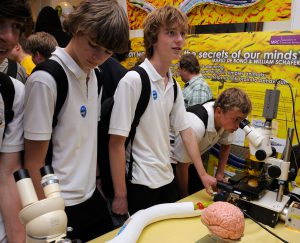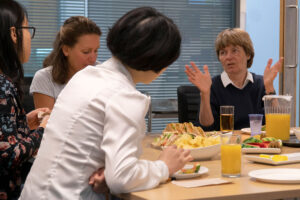While being Deputy Director of LMB, one of my priorities was to support women group leaders, especially those in junior tenure track positions. Indeed, supporting young group leaders has been my top aim during my many years as Divisional Head of Protein & Nucleic Acid Chemistry and, before that, of Cell Biology.
 By the time my children started leaving home, I gradually increased my travelling to meetings and serving on Grant and Careers Panels (by MRC, Cancer Research UK, the Royal Society, and the European Research Council), on Scientific Advisory Boards (in Spain, Switzerland and UK) and on Councils (European Molecular Biology Organization, Royal Society). It was pay-back time after years of declining invitations while looking after my young family! These activities provided valuable opportunities for networking, access to information useful for my leadership roles, as well as insights and experience as a basis for sound advice to aspiring young scientists who wish to start their own group in the UK or abroad.
By the time my children started leaving home, I gradually increased my travelling to meetings and serving on Grant and Careers Panels (by MRC, Cancer Research UK, the Royal Society, and the European Research Council), on Scientific Advisory Boards (in Spain, Switzerland and UK) and on Councils (European Molecular Biology Organization, Royal Society). It was pay-back time after years of declining invitations while looking after my young family! These activities provided valuable opportunities for networking, access to information useful for my leadership roles, as well as insights and experience as a basis for sound advice to aspiring young scientists who wish to start their own group in the UK or abroad.
 My personal experience of Swiss state-funded education sparked my interest in the UK education system, encountered through my two children and further consolidated while serving on the Education Committee of the Royal Society. I thus became an advocate of equal access for everyone to a broad spectrum of education and career opportunities. My intermittent engagements in outreach activities allowed me to convey my passion for science to non-scientists including pupils and young students.
My personal experience of Swiss state-funded education sparked my interest in the UK education system, encountered through my two children and further consolidated while serving on the Education Committee of the Royal Society. I thus became an advocate of equal access for everyone to a broad spectrum of education and career opportunities. My intermittent engagements in outreach activities allowed me to convey my passion for science to non-scientists including pupils and young students.
My advice to students and postdocs regarding their next career steps: only choose a career in academic science if you feel passionate about research! You will know by the end of your PhD whether you dream about your results and whether you are keen to discover how things work. If this is the case, choose a postdoc lab where you can bring something of your own while also tackling an interesting biological problem, and/or expand your technical experience. Doing a postdoc is your chance to start again and learn a new system, which will often become the basis for your own future research programme, so bear that in mind when you choose your future host. Being in a different country is highly advisable as this will broaden your horizon and allow you to build a new scientific network. It will also provide you with valuable insights into a different funding environment for science.
 Embarking on a career in academic science is tough, and you may only discover that this is the right path for you after your first few years as a postdoc. Alternatively, you may also decide, having completed your PhD, that academic science is not for you. In this case, there are plenty of attractive science-related career options, many of which do not require you to move abroad (and are therefore more compatible with, or adaptable to, your partner’s career). Excellent alternatives are biotech, science journalism, science outreach and science administration. Many of these careers require a PhD but not necessarily postdoc experience.
Embarking on a career in academic science is tough, and you may only discover that this is the right path for you after your first few years as a postdoc. Alternatively, you may also decide, having completed your PhD, that academic science is not for you. In this case, there are plenty of attractive science-related career options, many of which do not require you to move abroad (and are therefore more compatible with, or adaptable to, your partner’s career). Excellent alternatives are biotech, science journalism, science outreach and science administration. Many of these careers require a PhD but not necessarily postdoc experience.
If you continue to be obsessive about science after your first years of postdoc, you may decide to start your own independent career in research. If so, be confident and ambitious, and devote your later postdoc years to developing your own bold vision for your future research programme (rather than producing ever more papers). When applying for group leader positions, choose wisely as you may need core funding and infrastructure support from your future host institution, to get your research up and running. Securing grants can be tough, at least initially, until you achieve a sustained track record of your own independent research. Ideally, these criteria for choice of host are more decisive than trying to match your host’s location to your partner’s career: compromising too much on location at this stage can be detrimental to your ability to succeed in your own independent career – and can also be a tremendous strain on your partnership! Locations can be matched later, when you are in a position of strength.
Finally, there is never a perfect time, career-wise, to start your own family. But it can always be done provided you are motivated and committed to doing so. Combining science with bringing up young children means rigorous prioritising and focusing on what is most important for your next steps at work. A key watershed is your first publication from your own independent group. Establishing yourself internationally in your field is the next one. Remember to tackle, and tick off, one thing at the time – and learn to say no even if you are flattered about being asked!